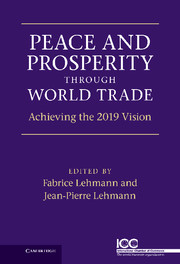Book contents
- Frontmatter
- Contents
- Notes on contributors
- Foreword
- Preface: the ICC vision
- Historical overview and dynamics
- Editorial note
- A Global systemic transformations
- B Governance of global trade
- C Poverty and global inequities
- D The long view on interlocking crises
- Editorial introduction
- D1 Trade and sustainable development: the ends must shape the means
- D2 Trade and climate change: the linkage
- D3 Destructive trade winds: trade, consumption and resource constraints
- D4 Trade and energy: a new clean energy deal
- D5 Agriculture and international trade
- D6 Water scarcity: how trade can make a difference
- D7 Water resources: a national security issue for the Middle East
- D8 Trade, technology transfer and institutional catch-up
- D9 A frail reed: the geopolitics of climate change
- E Global business responsibilities
- Conclusion: the imperative of inclusive global growth
- Index
D9 - A frail reed: the geopolitics of climate change
Published online by Cambridge University Press: 05 July 2011
- Frontmatter
- Contents
- Notes on contributors
- Foreword
- Preface: the ICC vision
- Historical overview and dynamics
- Editorial note
- A Global systemic transformations
- B Governance of global trade
- C Poverty and global inequities
- D The long view on interlocking crises
- Editorial introduction
- D1 Trade and sustainable development: the ends must shape the means
- D2 Trade and climate change: the linkage
- D3 Destructive trade winds: trade, consumption and resource constraints
- D4 Trade and energy: a new clean energy deal
- D5 Agriculture and international trade
- D6 Water scarcity: how trade can make a difference
- D7 Water resources: a national security issue for the Middle East
- D8 Trade, technology transfer and institutional catch-up
- D9 A frail reed: the geopolitics of climate change
- E Global business responsibilities
- Conclusion: the imperative of inclusive global growth
- Index
Summary
An awareness of climate change and of its potentially massive global effects is sharpening, just as the scientific consensus behind it has hardened and become more pessimistic. What is striking, however, about the response to this threat is the disconnect on the one hand between a growing awareness of its criticality, and on the other hand a blockage, both individual and collective, which results in a failure of policy to engage with the scale of the problem. Our growing awareness of the problem is then a frail reed on which to try to base a solution. What lies behind this disconnect?
The problem with climate change is that its consequences are high impact, but they are imprecise. They will occur at uncertain times and on uncertain timescales. There are also no parallels in our modern experience that we can draw on to make relevant comparisons. At an individual level, we are therefore slow to act because this looks like a complex nebulous problem, whose manifestations only play out some time in the future. And, as a general rule, the further into the future we look, the less detail we are able to pick out. So for many people, climate change becomes a problem where the most comfortable response (short of blaming others) is to ignore it, or to evade it. Knowledge by itself, as it turns out, is not enough.
At a collective geopolitical level, a number of factors come into play. Climate change is fundamentally a global problem.
- Type
- Chapter
- Information
- Peace and Prosperity through World TradeAchieving the 2019 Vision, pp. 227 - 232Publisher: Cambridge University PressPrint publication year: 2010

